Mayendit County
Mayendit County is one of the 9 counties of Unity State, in South Sudan. It borders Koch County to the north, Leer County to the east, and Panyijiar County to the south-east. The county is home to a total population of 70,936 people (UNOCHA 2022). Seasonal flooding has been increasing in the County since 2019 up to 2023, with perennial occurrences affecting 347 out of the 363 villages. In 2021 and 2022, a total of 59,356 individuals (8,840 households) were displaced by floods, bringing the number of internally displaced people in the county as a result of floods to 84% of the population. Most facilities (health, water, sanitation), crops, and animals are submerged, destroying households’ livelihoods. In Mayendit South, movement and delivery of services or supplies was nearly impossible, with small canoes made from the trunks of palm trees being the available means of transport[1].
The flooding and conflict affected food security Mayendit. The Integrated Phase Classification (IPC) projected the county to be at emergency (IPC level 4) in November 2022, and this classification persisted in April 2023. As of November 2022, at least 25% of households in Mayendit relied on humanitarian assistance for over 50% of their calorific needs[2].
Our intervention
Coalition for Humanity (CH) was funded by Food and Agriculture Organization of the United Nations (FAO), to implement an Emergency Livelihoods Response Programme (ELRP) in Mayendit County, Unity State, South Sudan. The primary goal of the ELRP was to mitigate the impact of conflict and displacement by improving food security and livelihoods for vulnerable populations in the county.
The key activities were capacity building for farmers and fisherfolk to equip them with the necessary skills for enhancing food security through proactive production. Additionally, the distribution of farm inputs such as crops and vegetable seeds, as well as farming and fishing tools, was carried out among farmers and fisherfolk.
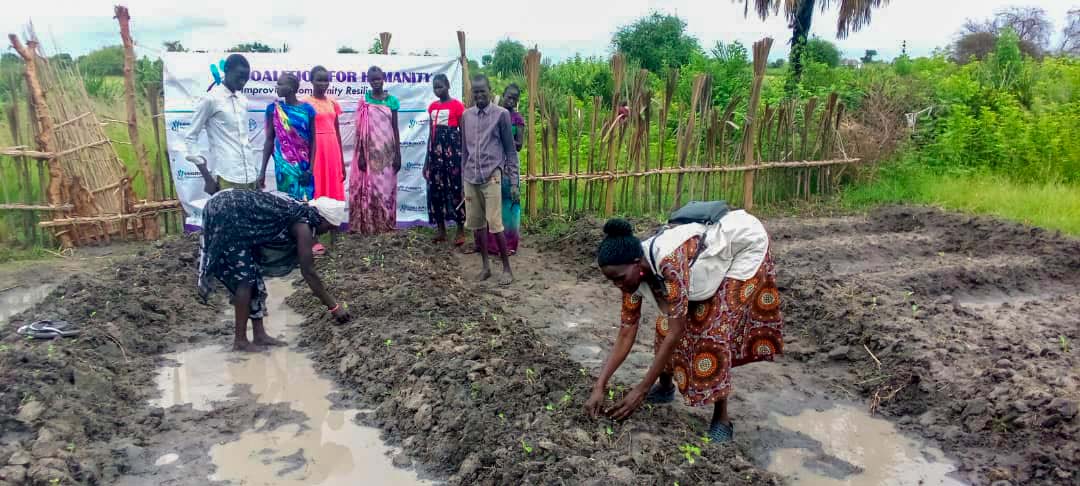
The Program Implementation
Prior to program implementation, CH conducted an assessment in July 2023, that revealed that all households in Mayendit had suffered livestock losses due to flooding, cattle raiding, and disease. This had a significant impact on livelihoods, particularly considering that 35% of households in the county relied on pastoralism. Additionally, the majority of households, 88%, lost crops, trees, fruits, and vegetables, with the extent of damage being substantial. Despite 83% of the land in Mayendit being arable, there was a noticeable lack of food within households, with the primary reasons for not practicing farming cited as flooding (51% of households) and lack of seeds (49%).
Furthermore, Mayendit has experienced an influx of returnees from Sudan since the outbreak of war in Khartoum on April 15, 2023. Records from the Relief and Rehabilitation Commission (RRC) indicate that the county had received 9,387 returnees as of June 2023. The integration of these returnees into the local community has further strained the already precarious food and livelihood situation in the county.
The project offered accountability to affected population to ensure that the intervention was responsive to the needs and priorities of the affected people, promote transparency, and foster a sense of ownership and participation among beneficiaries. Additionally, Coalition for Humanity (CH) established Accountability to Affected Population (AAP) committee to act as a liaison and a feedback channel between the project team and the beneficiaries. The purpose of this committee was to deliberate on the project’s scope, criteria for beneficiary selection, and the community’s role therein.
Coalition for Humanity (CH) conducted safety audits and gender-based violence (GBV) risk analyses in eight targeted Payams, using focus group discussions (FGD) to understand the challenges faced by vulnerable individuals, including marginalization, violence, and sexual exploitation and abuse. The aim was to pinpoint potential threats to the safety of vulnerable groups, especially women and girls, in project intervention areas, facilitating effective planning and integration of solutions. Common concerns highlighted through these audits included sexual harassment, theft, physical violence (particularly affecting women and girls), and security threats, notably in areas like grazing lands and fishing sites. Recommendations included implementing relevant bylaws to deter theft, raising awareness about preventing sexual harassment and abuse, and promoting community engagement for peace building. Although not all recommendations were executed within the program’s scope, CH prioritized collaboration with community members, local authorities, and Accountability to Affected Population (AAP) committees to ensure safety during project activities and implementation of security measures during program, resulting in no reported safety concerns during the project.
The program design was guided by a holistic approach to the food security challenge. CH focused on capacity building of farmers, ensuring access to inputs, seeds and market linkages, and nutrition and farmer practice social behaviour change communication (SBCC).
Capacity Building
Training of farmers on crop production
Most farmers/ households did not have sufficient knowledge in modern agricultural techniques and post-harvest management skills, which hindered their ability to effectively produce and preserve crops. This gap posed a threat to food security for vulnerable families in the community. In response to this, Coalition for Humanity (CH) provided training to 119 farmers, comprising 47 men and 72 women, on crop production to empower them with various aspects of farming and post-harvest management. The farmers were drawn from 8 Payams in Mayendit County. The training covered effective crop planting techniques and disease control methods aimed at optimizing yield and minimizing losses. Additionally, the farmers received guidance on diverse crop preservation methods and post-harvest management practices to ensure the longevity and quality of their produce. Ultimately, the training facilitated agricultural productivity, improved household access to food, and fostered economic self-reliance among farmers by enabling them to market surplus produce.
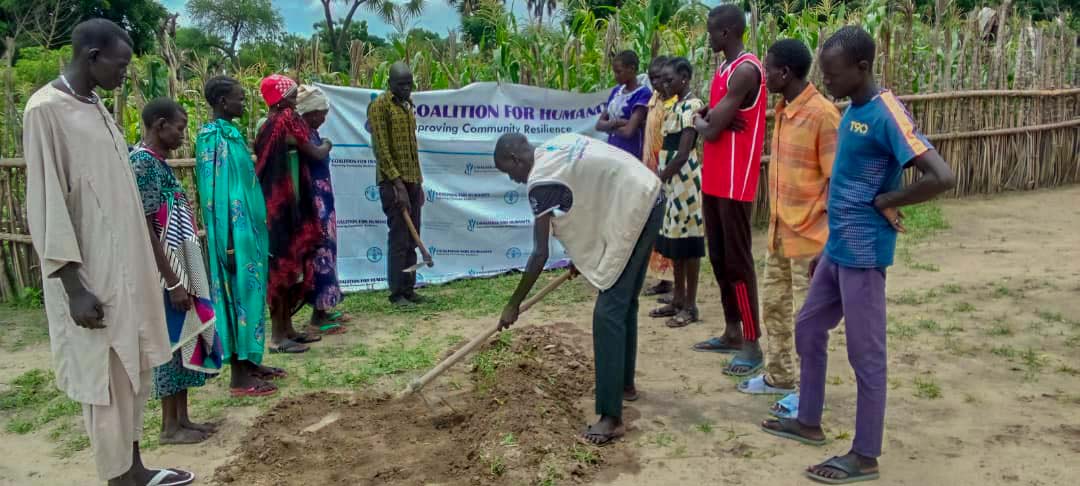
Training of farmers on land preparation in Mayendit County, Unity State, South Sudan
Training of farmers on vegetable production
Food insecurity was notable within households due to a limited variety of nutritional sources. This was primarily caused by factors such as low agricultural productivity, insufficient knowledge and skills in modern agricultural techniques, challenges in pest and disease management, restricted economic opportunities related to surplus produce storage and marketing, the necessity to enhance community resilience, and the aspiration to have a more extensive influence on food security and economic development. To address these challenges, Coalition for Humanity (CH) organized a training session for 106 farmers, consisting of 44 men and 62 women, focusing on vegetable production. The training, which was conducted across 8 Payams in Mayendit County, aimed at bolstering agricultural resilience and food security among vulnerable communities. The training sessions provided farmers with modern agricultural techniques and specialized knowledge concerning vegetable cultivation. This equipped them with the necessary skills to improve vegetable yields and quality. Additionally, the training covered crucial aspects of pest and disease management in vegetable farming, empowering farmers to effectively identify, control, and protect their crops from common threats.
Moreover, the training emphasized the promotion of economic self-reliance among farmers by encouraging proper storage and subsequent marketing of surplus produce. By imparting entrepreneurial skills and facilitating access to markets, the training created sustainable income-generating opportunities for participants, thereby enhancing their livelihoods.
Training of fisherfolk on fishing and fish preservation
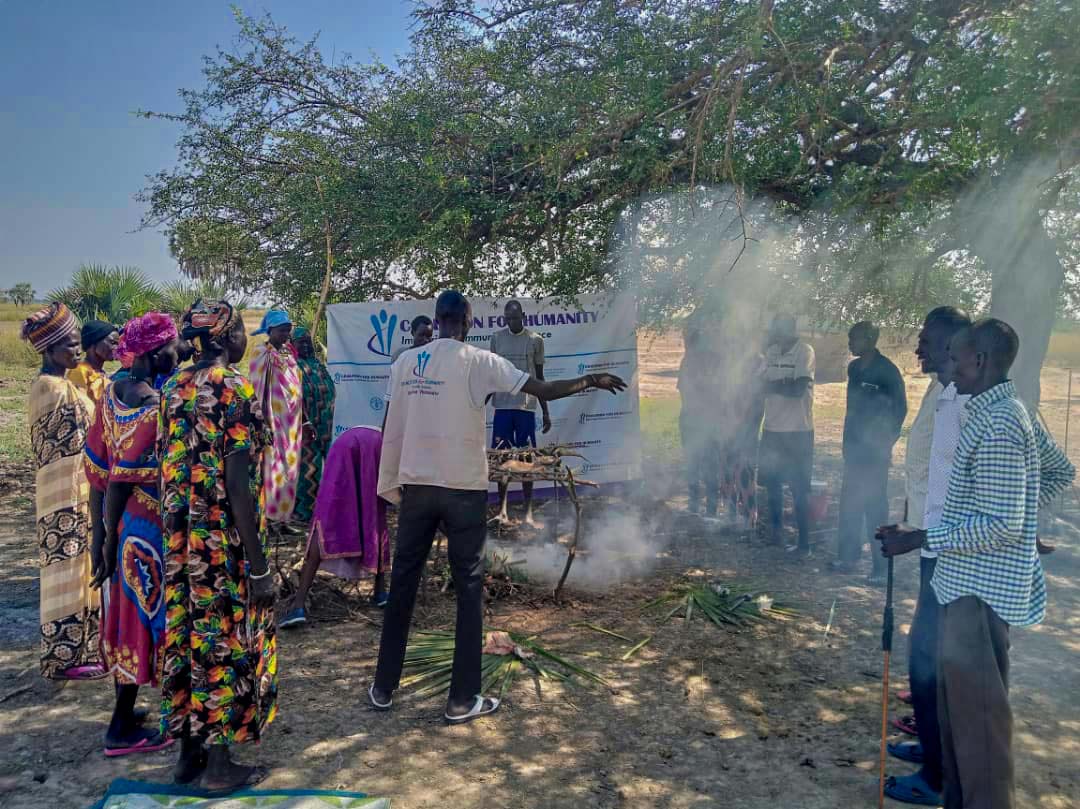
The organization conducted a training for 203 fisherfolk (110 men and 93 women) in Mayendit County, across 8 Payams. The training focused on fishing techniques and fish preservation. The training covered both traditional and modern methods, equipping the trainees with a diverse skill set to optimize their catch.
The fisherfolks in Mayardit County lacked sufficient access to modern fishing methods and advanced techniques for preserving fish. Furthermore, they had a limited understanding of the significance of fish preservation in prolonging shelf life and maintaining fish quality. These limitations contributed to food insecurity among fishing households, stemming from the inadequate optimization of their fishing livelihoods. The organization conducted a training for 203 fisherfolk (110 men and 93 women) in Mayendit County, across 8 Payams. The training focused on fishing techniques and fish preservation. The training covered both traditional and modern methods, equipping the trainees with a diverse skill set to optimize their catch. Furthermore, the training went beyond fishing techniques to emphasize the importance of fish preservation. In addition to traditional methods, the fisherfolk were taught advanced techniques to extend the shelf life and maintain the quality of their fish.
The sessions also provided a platform for open dialogue to identify and address common challenges faced by the fisherfolk. Through this participatory approach, practical measures were developed to overcome obstacles hindering the productivity and sustainability of fishing practices. This initiative ultimately fostered the sustainability and development of the fishing livelihoods.
Training of framer groups through demonstration plots
The farmers in Mayendit County lacked sufficient knowledge and skills regarding modern agricultural practices and sustainable farming techniques. This gap hindered the farmers’ ability to achieve optimal agricultural production, leading to food insecurity within the communities. Coalition for Humanity established eight farming demonstration plots across eight Payams in Mayedit County. These plots served as focal points for agricultural training through demonstration. Each of the demonstration plots was entrusted to a dedicated group of farmers for learning, management, and oversight. The organization delivered training through demonstration to the farmers’ groups on farm management and sustainable agricultural practices. The training involved 160 members of various farmer groups and focused on various aspects of crop and vegetable production, including soil management, irrigation techniques, seed selection, and pest control. Through this holistic approach to capacity building, the organization empowered the farmers with the skills and knowledge needed to achieve sustainable agricultural production and enhance food security within the communities.
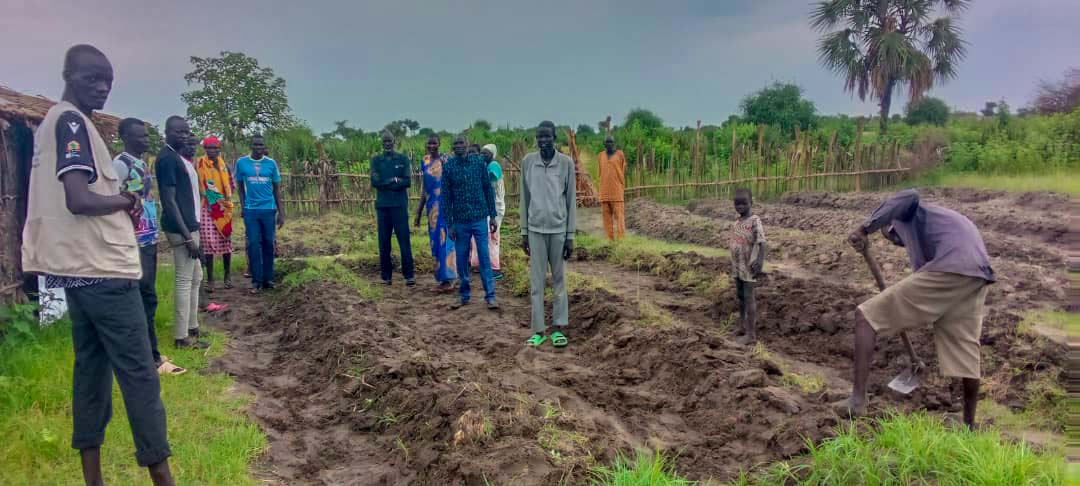
Capacity Building for farmer groups through demonstration plots
Moreover, the training emphasized the promotion of economic self-reliance among farmers by encouraging proper storage and subsequent marketing of surplus produce. By imparting entrepreneurial skills and facilitating access to markets, the training created sustainable income-generating opportunities for participants, thereby enhancing their livelihoods.
Access and Market Linkage
The community did not have access to the necessary tools and input for agricultural productions. This was due to various factors such as conflict, displacement, environmental challenges, and economic constraints, which hindered the ability of households to produce an adequate food supply and sustain their livelihoods. In response to this, Coalition for Humanity distributed farm inputs to 5,000 households in Mayendit County, spanning 8 Payams.
The distribution process involved thorough planning and coordination to ensure timely and equitable provision of the essential agricultural resources to the targeted beneficiaries. The organization collaborated with the AAP committees, local authorities, and the community leaders, to identify the specific needs and priorities of the households, informing the selection and procurement of appropriate inputs. The distribution process also involved a rigorous adherence to transparency, accountability, and inclusivity. Prior to the distribution, the organization conducted focused beneficiary identification and registration exercise, ensuring eligible households were considered and included. This process adhered to predetermined selection criteria, prioritizing vulnerable households including female-headed households, returnees, and internally displaced persons (IDPs).
Among the distributed inputs were crop kits containing assorted crop and vegetable seeds, tailored to suit the agro-climatic conditions of the County, thereby maximizing yield. Each household received 5kgs of maize seeds, 50g of Okra seeds, 30g of Pumpkin seeds, 20g of Green Pepper seeds, 20g of Tomato seeds, 20g of Amaranths seeds, and 20g of Kudra seeds. The priority on vegetable seeds aimed to diversify agricultural production and improve the nutritional intake of the communities. The households also received farming tools, including Hoes and Maloda (a traditional farming tool). Eac household received 1 Maloda, and 1 hoe. The tools were selected to fit cultural preferences and enhance cultivation performance while maximizing yield. Other inputs distributed were fishing kits, which included twines and monofilament. Each household received 1 Twine, and 1 Monofilament. By providing the essential fishing gear, the project aimed to empower fisherfolks within the community to increase their catch and productivity, thereby improving their income generation and food security. Furthermore, distribution activities included sensitization sessions, providing beneficiaries with guidance on proper utilization of the agricultural inputs and best practices for crop and vegetable production, and fishing. Ultimately, the distribution of agricultural inputs enhanced the resilience and self-reliance of the vulnerable households in Mayendit County. By equipping the community with the necessary resources and knowledge for sustainable agricultural practices, the program fostered long-term food security, livelihood enhancement, and community empowerment in the face of humanitarian crises.
Our Impact to the community
Post distribution monitoring survey
The survey sample comprised 101 household representatives from eight targeted Payams in the county, with a gender distribution of 52% males and 48% females.
Findings from the survey indicated that maize was the most distributed crop seed, with 98% of respondents receiving 5 kg each. However, only 36% were satisfied with the quantities received, indicating a desire for more substantial distributions. Among those who received maize, 68% rated the quality as good. Further analysis revealed that 44% of respondents sowed the maize they received, while 17% shared it out, and 18% consumed it.
Regarding agricultural tools, 98% of respondents received them, with each household receiving one maloda and one hoe. While 74% of households found the distributed tools satisfactory, 26% expressed dissatisfaction, with 88% of them preferring different types of tools.
In terms of vegetable seeds distributions, 96% of respondents benefited, although only 23% reported timely access to the seeds. Despite 74% rating the quality of the seeds as good, 59% of households were not satisfied with the quantity. Additionally, 86% of beneficiaries were satisfied with the type of vegetable seeds received, with 84% of dissatisfied respondents preferring other types of vegetables.
Regarding fishing kits, 97% of respondents confirmed receipt, with 90% benefiting from training on their use. A majority (70%) considered the kits to be of good quality, while 79% were satisfied with the type of kits distributed. However, only 21% of respondents were dissatisfied, with the remaining percentage expressing satisfaction. Further analysis revealed that 94% of respondents used monofilaments for fishing, while 88% used hooks, and 73% used twines.
Overall, the distribution of crop kits, vegetable kits, and agricultural tools significantly improved food security in the targeted community. Beneficiaries overwhelmingly confirmed using the distributed inputs, highlighting the effectiveness of targeted distributions and training programs. Despite challenges such as delays in receiving inputs and dissatisfaction with quantities distributed, the project fostered a strong desire among households to scale up farming and fishing activities. Ongoing engagement with communities, along with training and support initiatives, are crucial for sustaining and enhancing the impact of such interventions in addressing food insecurity.
Community Response and Feedback
Nyanyot’s Journey: Cultivating Hope Amidst Adversity
Nyanyot chang Juai is a resident of Mayiandit County, Unity State, South Sudan. Her story epitomizes the transformative potential of empowerment and determination in the face of adversity.
Before Nyanyot’s encounter with Coalition for Humanity (CH) and the Emergency Livelihoods Response Programme (ELRP), life was a relentless struggle for her and her family. They faced the harsh reality of food insecurity, relying solely on the scares fish and milk for sustenance. “My health was generally not good, and my children suffered due to the lack of a balanced diet,” Nyanyot recalls.
However, Nyanyot’s life took a remarkable turn when she became a beneficiary of the Emergency Livelihoods Response Programme (ELRP). She received training on modern farming methods and crops and vegetable seeds during the mega distribution. “I learned the importance of growing vegetables and how it can improve the health of my family,” she affirms. With newfound skills and resources, Nyanyot diligently tended to her garden, nurturing okra and kudoro, to provide for her children. She embraced the opportunity to diversify her crops, to supplement their diet during the hunger crisis.
The impact of Nyanyot’s efforts was profound, not only on her own life but also on her community. “The vegetables we have planted have boosted the health of my children and myself,” Nyanyot proudly declares. Through her determination and newfound knowledge, Nyanyot shattered the chains of dependency, emerging as an empowered woman and a provider for her family.
Looking ahead, Nyanyot envisions a future of self-reliance and prosperity for herself and her community. “Women nowadays are independent and are breadwinners in their families,” she asserts confidently. With continued support and access to resources, Nyanyot is determined to expand her agricultural endeavours, ensuring a brighter tomorrow for her family.
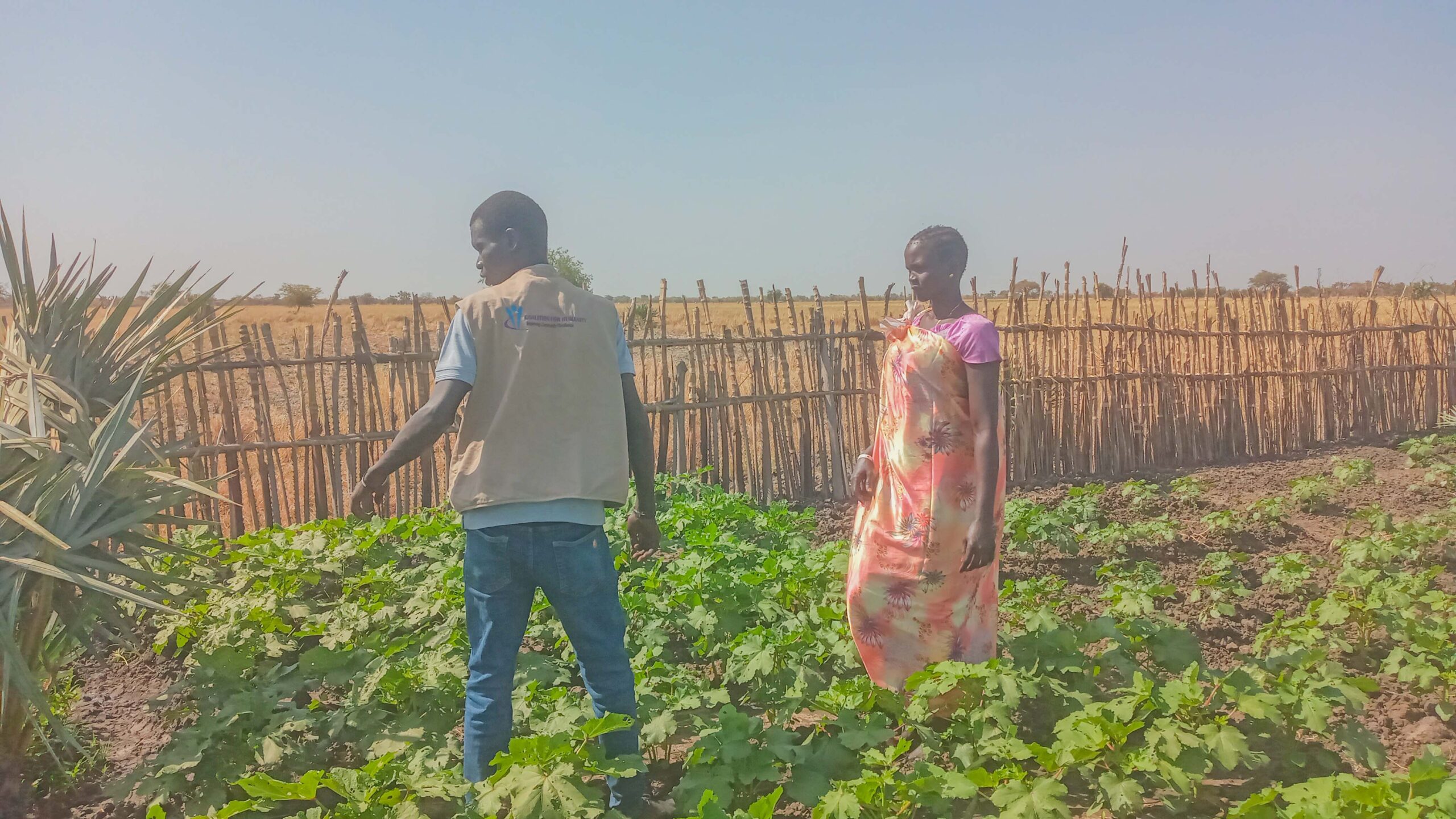
Nyanyot chang Juai engages with a program officer at her farm, in Mayendit County, during a monitoring visit.
Conclusion
This program has made remarkable progress towards achieving food security in Mayedit County. However, there are notable gaps in optimizing the full potential to become a food-secure region and a powerhouse in food production. The County has the potential for large-scale fishing, which could emerge as a major economic activity for its residents. Additional training for fishers in modern fishing techniques, fish preservation methods, value addition, and marketing could enhance focus on this resource and support its further development. Sensitizing and training communities in modern agricultural practices and the specific uses of improved agricultural equipment and inputs would significantly lead to improved food security and livelihoods. Early prepositioning of inputs will be crucial to ensuring timely access and use of kits ahead of the favourable planting seasons, which will improve yields and the overall satisfaction of beneficiaries. Continuous efforts to decentralize distribution sites to Payams and Boma levels will greatly reduce the overall time taken by beneficiaries to reach distribution sites, thus optimising access and use of the necessary inputs in enhancing food production.
Refrences
[1] Interagency Rapid Need Assessment (IRNA) Report: Mayendit county, Unity State, 03 – 08 September 2022
[2] https://www.csrf-southsudan.org/county_profile/mayendit/
[3] Mayendit County, Emergency Livelihoods Response Programme (ELRP) Post-distribution Monitoring (PDM) report, November 2023

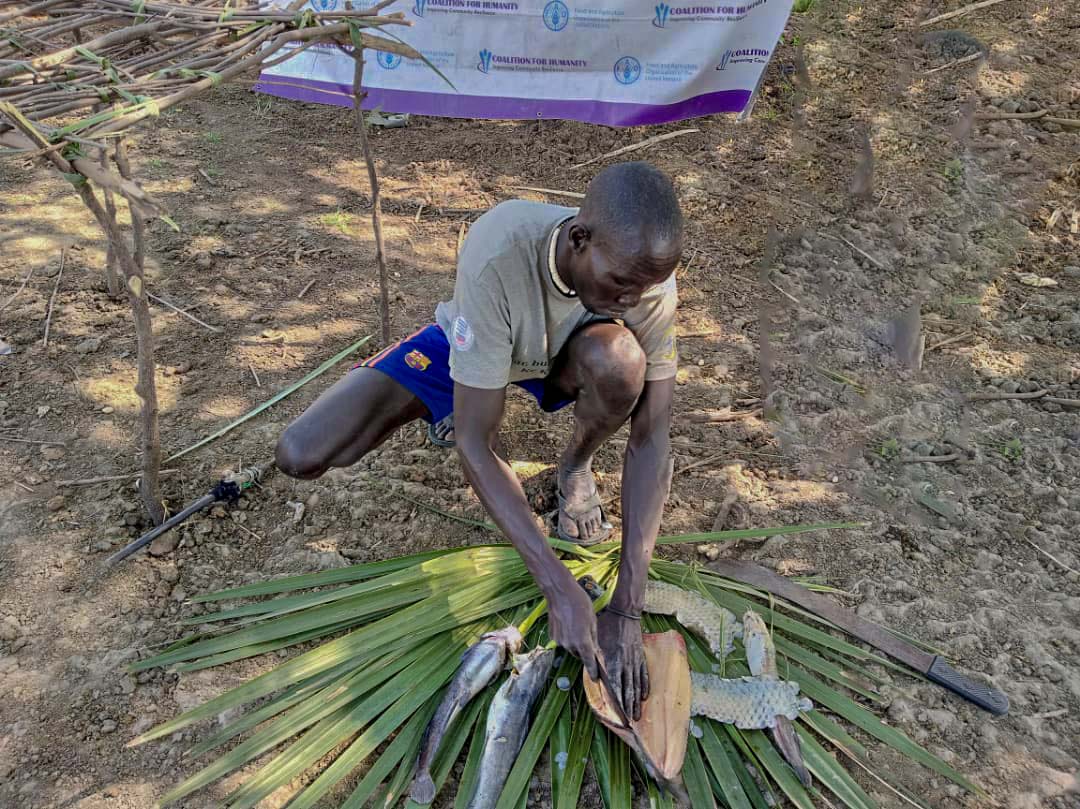
0 Comments